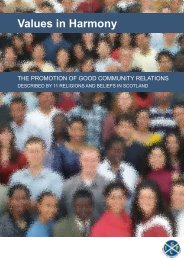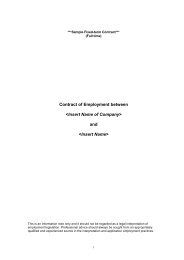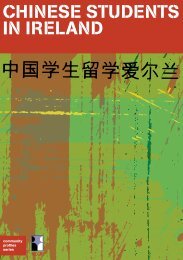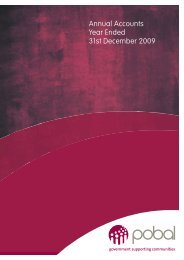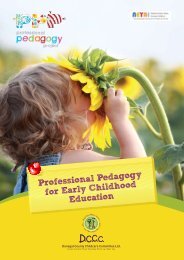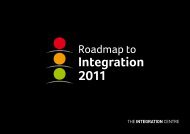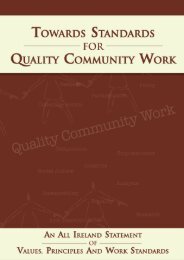Intercultural Education in the Post-Primary School - National Council ...
Intercultural Education in the Post-Primary School - National Council ...
Intercultural Education in the Post-Primary School - National Council ...
You also want an ePaper? Increase the reach of your titles
YUMPU automatically turns print PDFs into web optimized ePapers that Google loves.
APPROACHES AND METHODOLOGIES 6a poem or a story and <strong>the</strong>n ask <strong>the</strong>students <strong>in</strong> small groups to pick one l<strong>in</strong>efrom <strong>the</strong> story and create a still imageshow<strong>in</strong>g what is happen<strong>in</strong>g at thatmoment. When <strong>the</strong> teacher places his/herhand on a student’s shoulder <strong>the</strong>y areencouraged to verbalise <strong>the</strong>ir thoughts <strong>in</strong>character. The range of attitudes andthoughts that emerge can be <strong>the</strong> subject forrich discussion.Survey/questionnaireA survey or questionnaire can developskills of communication, ga<strong>the</strong>r<strong>in</strong>g and<strong>in</strong>terpret<strong>in</strong>g <strong>in</strong>formation and cooperation.It enables action beyond <strong>the</strong> classroom andcan often <strong>in</strong>volve <strong>the</strong> school or widercommunity.DEALING WITH CONTROVERSIAL ISSUESAll educators can f<strong>in</strong>d <strong>the</strong>mselves deal<strong>in</strong>gwith controversial issues <strong>in</strong> <strong>the</strong> classroom.Issues of justice and morality, of humanrights and responsibility, of belief andpractice, of life and its mean<strong>in</strong>g, are at <strong>the</strong>heart of all education. Therefore,controversial issues are encountered almostdaily <strong>in</strong> <strong>the</strong> classroom. These issues arecontroversial because <strong>the</strong>re is no one fixedor universally held po<strong>in</strong>t of view. Acontroversial issue is def<strong>in</strong>ed as an area of<strong>in</strong>quiry about which people can holds<strong>in</strong>cere conflict<strong>in</strong>g po<strong>in</strong>ts of view. There areoften diverse religious as well as secularperspectives on such issues.Because issues are controversial <strong>the</strong>y arelikely to challenge students' values, beliefs,and world views. This can be verythreaten<strong>in</strong>g and may even cause distress tosome students. Therefore whencontroversial issues are addressed <strong>in</strong> <strong>the</strong>classroom teachers need special skills toensure a positive outcome.An important outcome <strong>in</strong> teach<strong>in</strong>g aboutsuch controversial material would be toachieve a classroom atmosphere <strong>in</strong> whichstudents engage <strong>in</strong> <strong>in</strong>terest<strong>in</strong>g and <strong>in</strong>formeddialogues, free to express <strong>the</strong>ir op<strong>in</strong>ionsand relate <strong>the</strong>ir experiences, yet rema<strong>in</strong><strong>in</strong>grespectful of both o<strong>the</strong>r students and o<strong>the</strong>rop<strong>in</strong>ions.Achiev<strong>in</strong>g a balance of ‘freedom with<strong>in</strong>structure’ is not easy, and discomfort canresult if <strong>the</strong> balance between <strong>the</strong> two islost. This can arise from a too-tightlycontrolledclassroom <strong>in</strong> which students areafraid to speak or a too-loosely-controlledclassroom <strong>in</strong> which unchecked orun<strong>in</strong>formed personal op<strong>in</strong>ion monopoliseclass time. This section offers someguidel<strong>in</strong>es for facilitat<strong>in</strong>g discussion toachieve this balance.Some tips for teach<strong>in</strong>g controversial issuesThe follow<strong>in</strong>g tips are aimed at help<strong>in</strong>gteachers keep control of <strong>the</strong> situation whilema<strong>in</strong>ta<strong>in</strong><strong>in</strong>g open enquiry and dialogue.Make your classroom a safe place <strong>in</strong> whichto ask questions and discuss ideasBefore students can ask questions ordiscuss controversial issues, <strong>the</strong>y need tofeel that <strong>the</strong> classroom is a safe place <strong>in</strong>which to ask questions or disagree withclassmates without be<strong>in</strong>g put down for it.Ground rules for discussion should beestablished early <strong>in</strong> <strong>the</strong> year and re<strong>in</strong>forcedregularly - not just for discussions aboutcontroversial issues, but for all discussions.Appeal to students’ better natureIn <strong>in</strong>troduc<strong>in</strong>g an issue that has <strong>the</strong>potential to become controversial, teacherscan rem<strong>in</strong>d students of <strong>the</strong> importance ofrespect and tolerance. They might alsomake a humanitarian appeal to students toremember that prejudiced remarks made <strong>in</strong>class may offend or embarrass <strong>the</strong>irclassmates.<strong>Intercultural</strong> <strong>Education</strong> <strong>in</strong> <strong>the</strong> <strong>Post</strong>-<strong>Primary</strong> <strong>School</strong> 83




